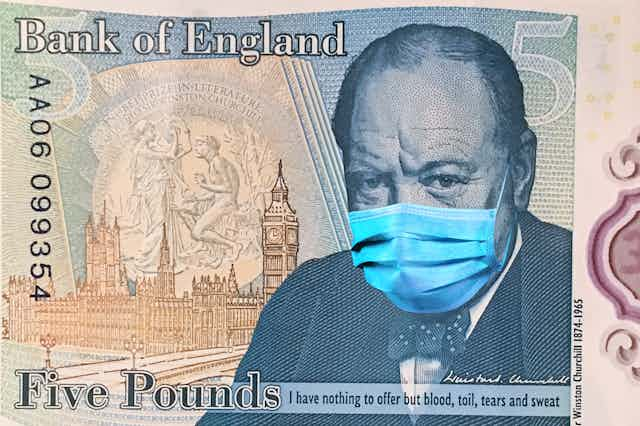Many opponents of the prolonged lockdown argue that as it is severely damaging the economy, ending it is the only way to bring the economy back to life. But the economy is already being damaged by this virulent, fast-spreading virus, to which there is no cure and currently no vaccine. Historical evidence from the 1918 flu shows that extending public health measures to prevent the spread of a virus does less economic damage in the long run than letting it ravage the entire population.
History also shows that pandemics have a long-lasting and severe effect on the economy. Looking at 15 major pandemics in Europe, from the Black Death in 1347 to the 1918 flu, researchers found that interest rates – and therefore investment – was depressed for between 30 and 50 years following an outbreak. This suggests that a “V-shaped” recovery – where economic growth returns to its previous level by the autumn – is highly unlikely.
Already the coronavirus has reduced economic activity by 30%, more than in the 1930s great depression, with unemployment rising to levels last seen in the 1980s during the Thatcher years. The cost to the government of preventing a deep depression will far exceed the already unprecedented sums it is currently spending on providing short-term relief.
A decade of despair
The government has exceeded its expectations in changing our behaviour. It is the fear of the pandemic that has made the lockdown successful. Lifting it will not remove that fear, which will continue to have a profound effect on consumer and business confidence, and economic output across the whole economy.
People will be reluctant to return to work or go shopping while the virus is still around. They will also hesitate to take on major financial commitments, such as buying a house. And businesses will be reluctant to make major investments, or even re-employ all their furloughed workers while the economic outlook is so uncertain.
The pandemic has administered a severe supply-side shock to a major part of the economy, with thousands of firms in the retail, travel and hospitality sectors, including British Airways and Debenhams, either laying off thousands of staff or going bankrupt. The collapse of global supply chains has also hit manufacturing. And our exports will be damaged by the global recession.
The millions of workers who will be permanently laid off in these industries will reinforce the downward spiral, reducing demand for goods and services across the whole economy. It will also negatively affect people’s health. And the lack of jobs will mean dire prospects for young people who are just starting out.
Long-term measures
Only the government can prevent this spiral of despair, by restoring business and consumer confidence, providing income support to prevent mass poverty, and directly intervening to revive industry.
The government will need to take centre stage in restructuring our crippled companies. It must take a strategic role, using its leverage to back those sectors that will improve productivity, if necessary by taking strategic stakes in vital industries like transport and utilities. We must not repeat the mistakes of the 2008 bailout, where banks prospered while real incomes for the majority stagnated.

To boost demand, the government will have to provide higher – and unconditional – benefits for the millions who will be unemployed, maybe moving towards a minimum income guarantee. It might also provide temporary government jobs to improve our social and physical infrastructure, such as happened in the New Deal in 1930s America, which improved schools and hospitals, built national parks and planted trees, and took plays around the country.
With industry on its knees, the government must play a bigger role in increasing investment to boost demand and ensure that our economy becomes more productive and more resilient in the long term. This must include major investments in our run-down public services, especially research and education, health, and the tottering under-funded social care system.
And the government will have to take a much more active role in the labour market, heavily subsidising jobs and training to encourage growth in the key sectors needed in the future.
It has already abandoned economic orthodoxy in the face of the crisis with its programme of temporary relief. But it must go much further, accepting a level of government debt that would be unimaginable before the crisis, and a level of intervention in the economy that is incompatible with its belief in untrammelled free enterprise.
It would be inconceivable if the UK government sought to manage that debt by a return to austerity. In the long term, the debt will be diminished by economic growth and modest inflation, while the recent drop in interest rates has reduced the cost of servicing it.
Over time, these measures could ensure not just an economic recovery, but also a society that is more resilient, fairer and more cohesive than what we have seen since the last financial crisis in 2008. Unless the government succeeds in reviving the economy as well as defeating the virus, it risks losing any newfound trust in its ability to govern.

